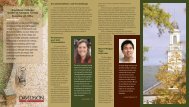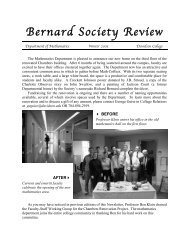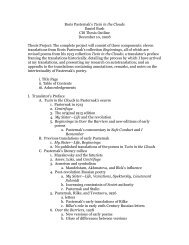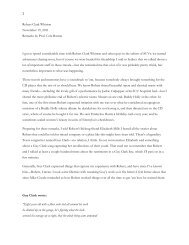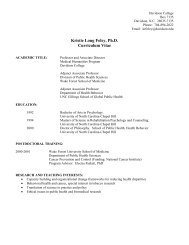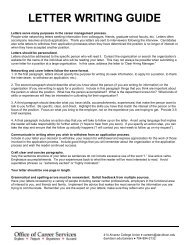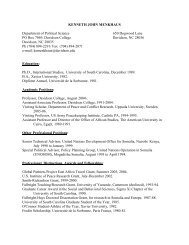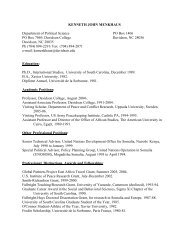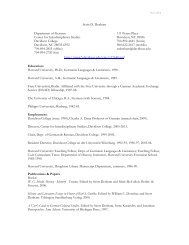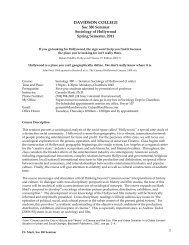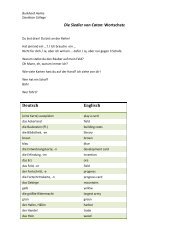Syllabus - Sociological Theory - Davidson College
Syllabus - Sociological Theory - Davidson College
Syllabus - Sociological Theory - Davidson College
You also want an ePaper? Increase the reach of your titles
YUMPU automatically turns print PDFs into web optimized ePapers that Google loves.
esearch needs, you are strongly encouraged to explore theoretical developments not discussed in this<br />
class through self-study. Of course, you are more than welcome to consult me for guidance. As a broad<br />
focus for our readings, please know that sociological theorists address two central sets of questions,<br />
which will be important themes of the class:<br />
Domination. What are the chief forms of domination in the modern world? To what extent is<br />
social order maintained through domination? What is freedom and how shall it be pursued?<br />
Solidarity. What is the relation between the individual and the larger society? To what extent is<br />
social order maintained through solidarity? Is it “human nature” to be autonomous, or to be in<br />
community with others? What are the prospects for autonomy and community in the modern world?<br />
Each theorist we discuss grapples with certain shared questions. As we read the works of these theorists,<br />
please keep the following questions in mind:<br />
• What is each theorist’s broader conception of the current epoch of human society (“modernity,”<br />
“late modernity,” “postmodernity,” or however characterized), including its particular problems<br />
and likely tendencies?<br />
• More broadly, how are we to understand “society”? How is it structured, what are its most<br />
central processes, and how and why does society change?<br />
• What is the relationship between “individuals” and “society”? How do the individual and<br />
society relate to one another?<br />
• How does each theorist explicitly or implicitly draw on the works of other sociological theorists,<br />
especially the “classic” theorists like Marx, Weber, and Durkheim? Alternately, how does, or<br />
how might, each theorist criticize the ideas and approaches of other theorists?<br />
• What is the mission and the method of the discipline we call sociology? How does each theorist<br />
approach metatheoretical debates about social theory itself and how it should be developed?<br />
• What sort of empirical research agenda or methodology follows from each of these theories of<br />
society?<br />
These questions continue to challenge today’s sociologists and, for inspiration and guidance, they return<br />
to the work of the theorists examined here.<br />
While some of this class will involve focused discussions by the instructor, much of my own comments<br />
and “mini-lectures” will be based on our careful discussion of your close readings of primary theory texts.<br />
None of this is easy reading. All of it is packed with complex conceptual content – our job will be to<br />
"unpack" these ideas. This is a collective enterprise. You should not expect to be able to be a "free rider"<br />
who benefits through the efforts of others. Therefore, we will read, and more importantly, talk theory<br />
together. If theoretical concepts remain abstract and you cannot see how they relate to real world<br />
situations, you do not know theory. You are expected, then, to come to class prepared to discuss the<br />
theories that we read. This does not mean that when you come to class you have a complete<br />
understanding of all the material. Class discussion is not only encouraged but expected. You may find<br />
some of the material unclear and have questions about it. You will have questions, other students will<br />
too. Together we will attempt to clarify them.<br />
The recommended procedure is to read material thoroughly before the day on which it is assigned, then<br />
to review it briefly following the discussion in class. <strong>Sociological</strong> theory is difficult because it is abstract.<br />
<strong>Theory</strong> cannot be memorized. Students will read from some rather difficult primary sources and write<br />
integrative essays which demonstrate an ability to analyze the "sociological masters" critically, compare<br />
their ideas with one another, and apply concepts in social analysis of the social world around them. You<br />
Page 2



